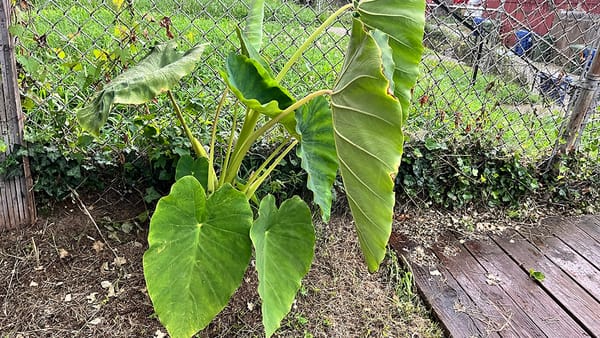Indignity Vol. 2, No. 34: The smell of success.
MARKETING DEP'T.

How Should a Newsletter Talk to You?
HELLO, INDIGNITY READERS! I'm going to try to do something slightly different in today's newsletter, as shown by this direct address, which I'm possibly already undermining.
I almost took a sick day instead of doing this edition. I had a down payment on one or possibly two pieces I wanted to write to start this week, and then I spent the weekend and Monday mostly flattened out in bed and asleep, often assisted by NyQuil, with what an ongoing series of at least two different brands of home antigen tests steadfastly affirms is not a case of Covid.
I know the antigen tests give false negatives, especially for the new strains, but I'm inclined to believe them. It feels like a terrible but ordinary head-and-chest cold, or like two years' worth of saved-up terrible ordinary colds rolled up into one. And my sense of smell is fine. Covid has done so many worse things to so many people, but the idea of losing the ability to smell has haunted me throughout the pandemic. Every now and then, through all these months and months, I get the urge to clamp a hand loosely over my nose, to trap the non-appealing yet reassuring odor of hand sweat and my own breath. At one point during the weekend I woke up in the middle of the night with a stabbing pain in the back of my nose that made me really think, this is it, accompanied by so much congestion that for a few long minutes in the dark I couldn't tell if I could still smell anything or not.
Plenty of people don't lose their sense of smell with Covid at all, of course. You know that. I think we're mostly on the same page here on Indignity, Covid-knowledge-wise, as a writing and reading community. Otherwise I assume you'd have bailed out a half-dozen mask-related tirades ago.
Indignity and its predecessor publications have always been strongly in favor of taking sick days. Faithful readers may recall we were advocating everyone take a break at the start of February 2020. Who knows how history would be different if more people had been reading back then?
But instead of skipping this edition, I'm taking the opportunity to address you, the readers, in a somewhat more direct and parasocial mode than the usual. I've been having a good time writing Indignity for you, and it seems as if most of you have been enjoying reading it. Where Indignity mostly needs to improve is in its performance with people who aren't reading it.
How do we build a larger community of readers, or, more bluntly, a larger base of paying subscribers? Why would I ask you? You're already reading it! But there is an aspect of newsletter culture that Indignity has not really been doing much of, which is to pursue closer engagement with the readers, to generate a self-reinforcing climate of enthusiasm, which -> [???] -> even more readers!
On some deep, unfortunate level my ideal for audience engagement has always been the early Jesus and Mary Chain, when the band would take the stage with their backs to the audience, play an almost undifferentiated blast of howling feedback with a few bits of old-fashioned pop melody being torn to shreds somewhere underneath it, and walk off again after 15 or 20 minutes. At least, that's how people said it went. By the time I finally got to see them, they had a full set list, supporting musicians, a drum machine, colored lights, projected images—the works, everything a normal customer might expect to get when they paid for a concert ticket.
What is a newsletter selling? Indignity throws two pieces of writing at your inbox a week, I think so far without interruption. From one angle, that's a professional relationship. (More professional, maybe, if we were delivering the writing at a predictable set of times each week. But. [Feedback noise.]) The premise of the newsletter model, really, though, is that the writer is supposed to be, to some extent, a commodity. Out of all the newsletters a reader could support, they support this one, because they feel like they are buying the writer's presence, or a connection with the writer.
(Halfway through that last sentence I went back and changed it from the second person to the third, because who could presume?)
Maybe the readers of Indignity would like to engage with the editorial staff of Indignity in the comments? Maybe you would enjoy chatting on a wisely curated Discord? The delightful and affable Rusty Foster, of Today in Tabs, does those things, and it all seems to serve him well. Today in Tabs is a really well-conceived newsletter in a way that forces me to steer away from its format, myself, so I don't end up doing a worse version of it.
There's a whole newsletter-recommendation engine that Substack just rolled out, to try to foster cross-promotion and various mutual benefits from what is, after all, a system that basically pits all of us individual writers against each other in a zero-sum or at best low-sum contest for inbox attention and subscriber dollars. When we get the hang of the system we will recommend Today in Tabs, as well as Alex Pareene's The AP, and Read Max by Max Read, which had a very good response to the news that Elon Musk had bought Twitter. And Heather Havrilesky's Ask Polly, for those of you who need more advice than The Sophist can provide.
None of this quite adds up to a marketing strategy, does it? But it feels helpful to talk it out a little.
One thing I thought about writing about, during the fraction of the weekend that I was awake and looking at the internet, was an—incident? event? a transient focus of discourse?—let's just call it a something, in which a Yale professor brought down the wrath and disdain of Twitter (and raised a small countercurrent of support) by tweeting, among other things, "I would regard myself as an abject failure if people are still not reading my philosophical work in 200 years."
It was a provocative thing to tweet! But before I could even start wringing the NyQuil out of my thoughts about the something, the new website operating under the name of Gawker published a pretty good meditation on it, and on the questions of ambition and obscurity and mortality it raised. It wasn't exactly what I would have written—one essential part of the furor around the professor, I would have said, was that he chose to post this particular thought on Twitter, the very place where writers and thinkers go to shovel our passing ideas or inspirations or clever sentences into a garbage incinerator, where we may count on their guaranteed annihilation, possibly after a brief acrid flare-up of catastrophic misunderstanding—but it made whatever else I might have been thinking unnecessary. It's a numbers game, the writing and the being alive, and the numbers are not in anybody's favor.
Yesterday, your Indignity Creative Director, Joe, shared with me the news that the oldest person in the world, Kane Tanaka, died this month in Japan at the age of 119. Tanaka was the second-oldest person of all time. I'd been keeping one eye on the oldest person since I wrote an essay about mortality, which started with the fact that the then-oldest person, Nabi Tajima, had just died at 117. I still have a Google Alert for "Nabi Tajima," which keeps coming up when the latest oldest person dies.
The new oldest person is Lucile Randon of France, who is already No. 4 all-time at 118, and who survived a case of Covid last year. Further down the standings there's an interesting conjunction between No. 5, Fusa Tatsumi of Osaka, who turned 115 yesterday, and an anonymous No. 6 from Hyogo, also in Japan, who is due to turn 115 on Friday. I hope all of them make a good run at Jeanne Calment, and her so far untouchable record of 122 years, 164 days.
Also in Japan this month, a 10-foot giant squid washed up alive in the shallows off the city of Obama, in Fukui Prefecture. I wrote a longish feature story about giant squid back in the 1990s, when one had never been photographed alive, so that they represented a still-impenetrable mystery of the natural world. Since then there have been a few sightings on video of live squid in their natural depths and of a moribund one near land. Tabloids and aggregators seem to be saying this one was taken to an aquarium alive, but Twitter appeared to settle on the more plausible conclusion that it died.
For really good writing about mortality and the transience of things, I recommend The Small Bow, which is published as a newsletter about addiction and recovery but which gives A.J. Daulerio the space to write some truly devastating essays about the experience of living, among other living people, regardless of what your relationship to addictive substances may be.
Who knows what's going to survive, or even make a difference? The best we can do is to keep writing and try to find readers who want to read it. I've written an entire book based on more than a year of reporting, and I've published one absurdly long abstract online essay, both of which I was reasonably satisfied with, as writing. I keep telling myself I really should reprint the essay; I think the publication rights were in the bundle of things bought up by the guy who owns the Gawker name now. Maybe he'd sell me back my piece if I asked.
Neither of those things had the staying power of a short thing I dashed off in a single day, about how long it takes to caramelize onions. I lied or overstated the case a little, earlier, about how Twitter is strictly a place for destroying ideas; sometimes I get mad and tweet something and then stay mad and turn the thing that was bothering me into a published piece. This was one of those times, and it turned out that a lot of people hadn't known that recipes were lying to them about how long it takes to cook onions, so they thought they were just the kind of people who couldn't learn to cook properly. It made a real difference for them to learn the truth. That piece still comes back to life and gets shared around every now and then, sometimes when I'm in a fallow spell.
I'm not sure this has done all that much to advance the project of figuring out how to attract more readers, but it's been nice talking unilaterally at you in this more informal mode. If there's an edition you've particularly enjoyed, though, please do share it with other people. (Probably not this edition.)
Please also send more of your problems or non-problems to The Sophist, who has a great time addressing them and looks forward to writing as many advice columns as possible. Tell us if you want to chat! Or if there's something else we should be doing.
For our longest-reading newsletter subscribers—or for those who want to catch up—Joe and I are definitely going to turn our old collection of 19 Folktales, illustrated by Jim Cooke, into a physical book before the holiday gift season. Usually we intend to do this but forget about it until November.
Thanks for reading! We appreciate you more than we can say, but we'll work on finding ways to say it more.
See you sometime between Thursday and Saturday,
Tom






